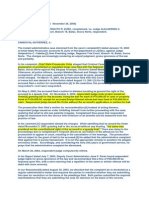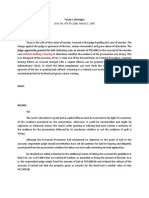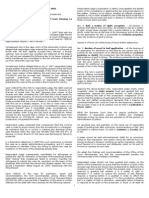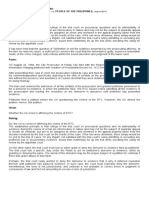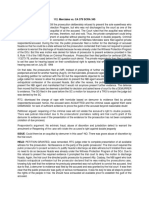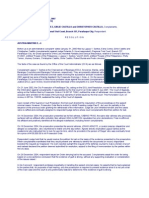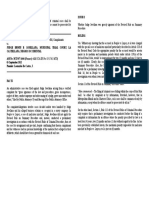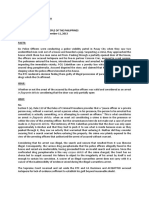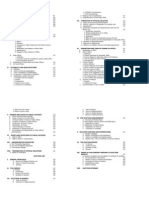0 ratings0% found this document useful (0 votes)
265 viewsCortes
Cortes
Uploaded by
imXinYJudge Segundo Catral is found guilty of gross ignorance of the law for granting bail to accused in two murder cases without conducting mandatory hearings. The Supreme Court explains that bail hearings are required for offenses punishable by death or life imprisonment to determine the strength of evidence. A hearing allows the judge to properly weigh evidence, consider prosecution's recommendations, and exercise sound discretion. While one case was later dismissed, Judge Catral's failure to hold hearings was a procedural lapse. The Court orders the judge to pay a fine and warns of more severe penalties for future similar acts.
Copyright:
© All Rights Reserved
Available Formats
Download as DOCX, PDF, TXT or read online from Scribd
Cortes
Cortes
Uploaded by
imXinY0 ratings0% found this document useful (0 votes)
265 views2 pagesJudge Segundo Catral is found guilty of gross ignorance of the law for granting bail to accused in two murder cases without conducting mandatory hearings. The Supreme Court explains that bail hearings are required for offenses punishable by death or life imprisonment to determine the strength of evidence. A hearing allows the judge to properly weigh evidence, consider prosecution's recommendations, and exercise sound discretion. While one case was later dismissed, Judge Catral's failure to hold hearings was a procedural lapse. The Court orders the judge to pay a fine and warns of more severe penalties for future similar acts.
Original Description:
Consti 2
Copyright
© © All Rights Reserved
Available Formats
DOCX, PDF, TXT or read online from Scribd
Share this document
Did you find this document useful?
Is this content inappropriate?
Judge Segundo Catral is found guilty of gross ignorance of the law for granting bail to accused in two murder cases without conducting mandatory hearings. The Supreme Court explains that bail hearings are required for offenses punishable by death or life imprisonment to determine the strength of evidence. A hearing allows the judge to properly weigh evidence, consider prosecution's recommendations, and exercise sound discretion. While one case was later dismissed, Judge Catral's failure to hold hearings was a procedural lapse. The Court orders the judge to pay a fine and warns of more severe penalties for future similar acts.
Copyright:
© All Rights Reserved
Available Formats
Download as DOCX, PDF, TXT or read online from Scribd
Download as docx, pdf, or txt
0 ratings0% found this document useful (0 votes)
265 views2 pagesCortes
Cortes
Uploaded by
imXinYJudge Segundo Catral is found guilty of gross ignorance of the law for granting bail to accused in two murder cases without conducting mandatory hearings. The Supreme Court explains that bail hearings are required for offenses punishable by death or life imprisonment to determine the strength of evidence. A hearing allows the judge to properly weigh evidence, consider prosecution's recommendations, and exercise sound discretion. While one case was later dismissed, Judge Catral's failure to hold hearings was a procedural lapse. The Court orders the judge to pay a fine and warns of more severe penalties for future similar acts.
Copyright:
© All Rights Reserved
Available Formats
Download as DOCX, PDF, TXT or read online from Scribd
Download as docx, pdf, or txt
You are on page 1of 2
DOCTRINE:
The right to bail can only be availed of by a person who is in
custody of the law or otherwise deprived of his liberty and it would
be premature, not to say incongruous, to file a petition for bail for
some whose freedom has yet to be curtailed.
The judge is mandated to conduct a hearing even in cases where
the prosecution chooses to just file a comment or leave the
application of bail to the sound discretion of the court.
A hearing is likewise required if the prosecution refuses to adduce
evidence in opposition to the application to grant and fix bail. The
importance of a hearing has been emphasized in not a few cases
wherein the court ruled that, even if the prosecution refuses to
adduce evidence or fails to interpose an objection to the motion for
bail, it is still mandatory for the court to conduct a hearing or ask
searching questions from which it may infer the strength of the
evidence of guilt, or the lack of it against the accused.
FLAVIANO B. CORTES, complainant,
vs.
JUDGE SEGUNDO B. CATRAL, Regional Trial Court, Branch 7, Aparri,
Cagayan, respondent.
A.M. No. RTJ-97-1387
September 10, 1997
ROMERO, J.:
NATURE OF CASE:
Administrative Matter
In his comment dated August 16, 1996, respondent judge branded
the complainant as a self-anointed concern (sic) citizen of Aparri, Cagayan
who has gained notoriety as a character assassinator, a public nuisance
and most often called speaker for hire during election time. Respondent
further laments that a ghost lawyer is taking advantage of the notoriety of
Mr. Flaviano Cortes by manipulating him like a robot and letting him loose
like a mad dog barking on the wrong tree and biting everybody including
the other members of the bench.
The Office of the Court Administrator recommended the dismissal
of the complaint saying that there is nothing in the allegations of the
complainant that would warrant the imposition of administrative sanction
against the judge.
In recommending the dismissal of the complaint against
respondent judge, the Office of the Court Administrator noted, x x x
complainant failed to show any indication that bad faith motivated the
actuation of the respondent in granting and reducing the amount of bail of
the accused in some of the criminal cases that were assigned in his sala. x
x x it is crystal clear that the increase or reduction of bail rests in the sound
discretion of the court depending upon the particular circumstances of the
case. It should be noted further that the reduction in the amount of bail of
the accused in the criminal cases in question were all done by the
respondent with the knowledge and conformity of the Public Prosecutor
concerned. Moreover, the actions taken by the respondent were in the
exercise of judicial discretion that may not be assailed in an administrative
proceeding.
The Supreme Court disagrees.
BRIEF
The Court in this case elucidates the rules in the grant of the application
for bail.
ISSUE OF THE CASE
Whether Judge Catral is guilty of gross ignorance of the law for
having granted bail to the accused in Criminal Cases 07-874 and 08-866.
FACTS
COURT RATIONALE ON THE ABOVE FACTS
Judge Segundo B. Catral is guilty of gross ignorance of the law for
having granted bail to the accused in Criminal Cases 07-874 and 08-866
without having conducted the requisite hearing.
A sworn letter complaint was filed by Flaviano Cortes charging
Judge Segundo B. Catral of the RTC of Aparri, Cagayan with Gross
Ignorance of the Law committed when:
(1) he granted bail in murder cases without hearing (People v. Duerme, et
al., Criminal Case 07-894 for murder; People v. Rodrigo Bumanglag,
Criminal Case 08-866 for murder);
(2) he reduced the bailbond granted by the provincial prosecutor from
P180,000 to P30,000 without hearing (Barangay Captain Rodolfo
Castanedas Criminal Case 11-6250 for Illegal Possession of Firearm);
(3) he granted a bailbond of P14,800 in a homicide case (Barangay Captain
Nilo de Rivera); and (4) he acquitted Jimmy Siriban, the rumors spreading
that the wife of Judge Segundo Catral went to Jimmy Siribans house to get
the envelop.
Bail is the security required by the court and given by the accused
to ensure that the accused appears before the proper court at the
scheduled time and place to answer the charges brought against him or
her. It is awarded to the accused to honor the presumption of innocence
until his guilt is proven beyond reasonable doubt, and to enable him to
prepare his defense without being subject to punishment prior to
conviction.
Bail should be fixed according to the circumstances of each
case. The amount fixed should be sufficient to ensure the presence of the
accused at the trial yet reasonable enough to comply with the
constitutional provision that bail should not be excessive.
Therefore, whether bail is a matter of right or of discretion,
reasonable notice of hearing is required to be given to the prosecutor or
fiscal or at least he must be asked for his recommendation because in
fixing the amount of bail, the judge is required to take into account a
number of factors such as the applicants character and reputation,
forfeiture of other bonds or whether he is a fugitive from justice.
When a person is charged with an offense punishable by
death, reclusion perpetua or life imprisonment, bail is a matter of
discretion. Rule 114, Section 7 of the Rules of Court states: No person
charged with a capital offense, or an offense punishable by reclusion
perpetua or life imprisonment when the evidence of guilt is strong, shall be
admitted to bail regardless of the stage of the criminal action.
Consequently, when the accused is charged with an offense punishable by
death, reclusion perpetua or life imprisonment, the judge is mandated to
conduct a hearing, whether summary or otherwise in the discretion of the
court, not only to take into account the guidelines set forth in Section 9,
Rule 114 of the Rules of Court, but primarily to determine the existence of
strong evidence of guilt or lack of it, against the accused.
Respondent judge, in two instances, granted bail to an accused
charged with murder, without having conducted any hearing as to whether
the evidence of guilt against the accused is strong.
As held in Basco vs. Rapatalo, the judge is mandated to conduct a
hearing even in cases where the prosecution chooses to just file a
comment or leave the application of bail to the sound discretion of the
court. A hearing is likewise required if the prosecution refuses to adduce
evidence in opposition to the application to grant and fix bail. The
importance of a hearing has been emphasized in not a few cases wherein
the court ruled that, even if the prosecution refuses to adduce evidence or
fails to interpose an objection to the motion for bail, it is still mandatory for
the court to conduct a hearing or ask searching questions from which it
may infer the strength of the evidence of guilt, or the lack of it against the
accused.
The reason for this is plain. Inasmuch as the determination of
whether or not the evidence of guilt against the accused is strong is a
matter of judicial discretion, it may rightly be exercised only after the
evidence is submitted to the court at the hearing. Since the discretion is
directed to the weight of evidence and since evidence cannot properly be
weighed if not duly exhibited or produced before the court, it is obvious
that a proper exercise of judicial discretion requires that the evidence of
guilt be submitted to the court, the petitioner having the right of cross
examination and to introduce evidence in his own rebuttal.
The fact that Criminal Case 07-874 was subsequently dismissed by
Judge Alameda does not completely exculpate Judge Catral. The judge is
not bound by the recommendation of the prosecutor and the affidavits and
sworn statements of the witnesses are mere hearsay statements which
could hardly be the basis for determining whether or not the evidence of
guilt against the accused is strong. The procedural lapse of the judge
is aggravated by the fact that even though the accused in Criminal Case
07-874 (People v. Ahmed Duerme), have yet to be arrested, respondent
already fixed bail in the sum of P200,000.00. The right to bail can only be
availed of by a person who is in custody of the law or otherwise deprived
of his liberty and it would be premature, not to say incongruous, to file a
petition for bail for some whose freedom has yet to be curtailed.
Be that as it may, the Court reiterates the following duties of the
trial judge in case an application for bail is filed:
1. In all cases, whether bail is a matter of right or of discretion, notify the
prosecutor of the hearing of the application for bail or require him to
submit his recommendation;
2. Where bail is a matter of discretion, conduct a hearing of the application
for bail regardless of whether or not the prosecution refuses to present
evidence to show that the guilt of the accused is strong for the purpose of
enabling the court to exercise its sound discretion;
3. Decide whether the guilt of the accused is strong based on the summary
of evidence of the prosecution;
4. If the guilt of the accused is not strong, discharge the accused upon the
approval of the bailbond. Otherwise petition should be denied
SUPREME COURT RULING:
WHEREFORE, in view of the foregoing, respondent Judge Segundo B.
Catral is hereby ORDERED to pay a fine P20,000.00 with the WARNING that
a repetition of the same or similar acts in the future will be dealt with more
severely.
SO ORDERED.
You might also like
- Group 2 - Bail (Complete)Document40 pagesGroup 2 - Bail (Complete)miyumi100% (2)
- De Los Santos V MontesaDocument3 pagesDe Los Santos V MontesaSean GalvezNo ratings yet
- Enrile vs. People, 766 SCRA 1Document3 pagesEnrile vs. People, 766 SCRA 1imXinY100% (1)
- Cortes v. CatralDocument2 pagesCortes v. CatralJoycee Armillo100% (3)
- Cortes V CatralDocument1 pageCortes V CatralValerie Aileen AnceroNo ratings yet
- Cortes v. Catral (1997)Document2 pagesCortes v. Catral (1997)Junmer OrtizNo ratings yet
- Rule 114 FulltextDocument26 pagesRule 114 FulltextStruggling Law StudentNo ratings yet
- ENRILE V. SANDIGANBAYAN, August 18, 2015, G.R. No. 213847: Answers To Guide QuestionsDocument7 pagesENRILE V. SANDIGANBAYAN, August 18, 2015, G.R. No. 213847: Answers To Guide QuestionsmiyumiNo ratings yet
- 13 Borinaga V TaminDocument2 pages13 Borinaga V TaminArtemisTzy100% (1)
- Cortes V CatralDocument4 pagesCortes V CatralYrra LimchocNo ratings yet
- Basco Vs RapataloDocument20 pagesBasco Vs RapataloNivla XolerNo ratings yet
- 5-5. Cortes v. CatralDocument5 pages5-5. Cortes v. CatralJovz BumohyaNo ratings yet
- Cortes v. CatralDocument4 pagesCortes v. CatralNJ LinNo ratings yet
- SEC. 13 BailDocument25 pagesSEC. 13 BailSheena MarieNo ratings yet
- C3 - 47 - Grageda vs. TresvallesDocument2 pagesC3 - 47 - Grageda vs. TresvallesKat ManongdoNo ratings yet
- Aguirre V Judge Belmonte Case DigestDocument4 pagesAguirre V Judge Belmonte Case DigestArlene Q. SamanteNo ratings yet
- Zuño V Judge CabebeDocument1 pageZuño V Judge CabebeDenardConwiBesaNo ratings yet
- Cases - Feliciano Vs PasicolanDocument5 pagesCases - Feliciano Vs PasicolanCelinka ChunNo ratings yet
- Right To BailDocument184 pagesRight To BailEngelov Angtonivich0% (1)
- Zuno Vs Cabebezuno Vs CabebeDocument4 pagesZuno Vs Cabebezuno Vs CabebeEmil BautistaNo ratings yet
- POLIREV - Right To BailDocument72 pagesPOLIREV - Right To BailPeasant MarieNo ratings yet
- Zuno Vs CabebeDocument2 pagesZuno Vs CabebeEdward Kenneth KungNo ratings yet
- People Vs Judge Cabral (Case Summary)Document3 pagesPeople Vs Judge Cabral (Case Summary)Nanya BiznesNo ratings yet
- Tucay v. Domagas (Hearing On The Application For Bail Is Necessary)Document2 pagesTucay v. Domagas (Hearing On The Application For Bail Is Necessary)kjhenyo218502No ratings yet
- 1 Te vs. PerezDocument27 pages1 Te vs. PerezShari ThompsonNo ratings yet
- Go vs. CADocument12 pagesGo vs. CAsideysiakoNo ratings yet
- DOcena-Caspe Vs BugtasDocument11 pagesDOcena-Caspe Vs BugtasSachuzen100% (1)
- Gatdula Vs PeopleDocument1 pageGatdula Vs PeopleTootsie GuzmaNo ratings yet
- Complainant Vs Vs Respondent Rogelio A Ajes: Second DivisionDocument17 pagesComplainant Vs Vs Respondent Rogelio A Ajes: Second Divisioncg__95No ratings yet
- Zuno vs. CabebeDocument1 pageZuno vs. CabebeTiffNo ratings yet
- CrimPro - Roberts Jr. Cs. CADocument4 pagesCrimPro - Roberts Jr. Cs. CAJORDAN GONONo ratings yet
- BailDocument38 pagesBailclaire beltranNo ratings yet
- Right To BailDocument4 pagesRight To BailotthonrpolisisNo ratings yet
- CrimPro Digests - CalvinDocument15 pagesCrimPro Digests - CalvinmjpjoreNo ratings yet
- Merciales vs. CA 379 SCRA 345Document11 pagesMerciales vs. CA 379 SCRA 345Lj Brazas SortigosaNo ratings yet
- Criminal Procedure Lecture 16 AppealsDocument6 pagesCriminal Procedure Lecture 16 AppealsPhilip KimawachiNo ratings yet
- RULE 114 Bail: What Is The Primary Purpose of Bail?Document9 pagesRULE 114 Bail: What Is The Primary Purpose of Bail?salpandita100% (1)
- Ligaya V. Santos, Et Al. vs. Judge R. G. How EtcDocument5 pagesLigaya V. Santos, Et Al. vs. Judge R. G. How EtcjafernandNo ratings yet
- Crim Pro DigestDocument2 pagesCrim Pro DigestJunalyn BuesaNo ratings yet
- CrimPro Report: Motion To Demurrer of EvidenceDocument3 pagesCrimPro Report: Motion To Demurrer of EvidenceKelly Manantan CoNo ratings yet
- People Vs Cabral - 131909 - Synopsis - SyllabiDocument3 pagesPeople Vs Cabral - 131909 - Synopsis - SyllabiJune Canicosa HebrewNo ratings yet
- PleasDocument15 pagesPleassolomonofficiallyNo ratings yet
- Evidence: Basic Principles and Selected Problems: by Justice Alfredo L. BenipayoDocument23 pagesEvidence: Basic Principles and Selected Problems: by Justice Alfredo L. BenipayoedcaratsNo ratings yet
- Palino Alexis-Asynchronous-Activity-November-18-2023Document11 pagesPalino Alexis-Asynchronous-Activity-November-18-2023Alex Malabanan PalinoNo ratings yet
- Zuño vs. Judge CabebeDocument2 pagesZuño vs. Judge CabebeIrvinzor GallardoNo ratings yet
- Pre Trial AssignmentDocument9 pagesPre Trial AssignmentKidest AbateNo ratings yet
- Aleria Jr. vs. VelezDocument2 pagesAleria Jr. vs. VelezRalph Jarvis Hermosilla AlindoganNo ratings yet
- People V SobrespeñaDocument1 pagePeople V Sobrespeñasig bNo ratings yet
- Crim Law Compiled CasesDocument272 pagesCrim Law Compiled CasesPaula Laine MarbellaNo ratings yet
- Evidence Outline: Open Court Examination ExceptionsDocument13 pagesEvidence Outline: Open Court Examination ExceptionschristineNo ratings yet
- Concerned Citizens v. Judge Elma (Hearing On The Application For Bail Is Necessary)Document2 pagesConcerned Citizens v. Judge Elma (Hearing On The Application For Bail Is Necessary)kjhenyo218502No ratings yet
- Group 14: ABROGUENA, Clarisse Jhil A. YEPES, JR., Leonardo ANDRES, KristineDocument19 pagesGroup 14: ABROGUENA, Clarisse Jhil A. YEPES, JR., Leonardo ANDRES, KristineGeorge AlmedaNo ratings yet
- For Offenses Where A Preliminary Investigation Is RequiredDocument7 pagesFor Offenses Where A Preliminary Investigation Is RequiredLei GarciaNo ratings yet
- RIGHT TO BAIL Case DoctrinesDocument37 pagesRIGHT TO BAIL Case DoctrinesEileen MañiboNo ratings yet
- People Vs Santiago Case DigestDocument3 pagesPeople Vs Santiago Case DigestRPSMU PROTWO0% (1)
- Te v. CA GR No. 126746Document8 pagesTe v. CA GR No. 126746AJENo ratings yet
- Abriol v. HomeresDocument3 pagesAbriol v. HomeresjeyarelsiNo ratings yet
- The Trial Process in KenyaDocument8 pagesThe Trial Process in KenyaMuthoni60% (5)
- Copy CRIMPRO TAKEHOME QUIZ 1Document9 pagesCopy CRIMPRO TAKEHOME QUIZ 1Mary Joyce Lacambra AquinoNo ratings yet
- An Inexplicable Deception: A State Corruption of JusticeFrom EverandAn Inexplicable Deception: A State Corruption of JusticeNo ratings yet
- People Vs JanjalaniDocument3 pagesPeople Vs JanjalaniimXinY100% (1)
- Questions 3 and 4 JurisprudenceDocument1 pageQuestions 3 and 4 JurisprudenceimXinYNo ratings yet
- Project Brief TemplateDocument1 pageProject Brief TemplateimXinYNo ratings yet
- People Vs Henry Go - Private IndividualDocument3 pagesPeople Vs Henry Go - Private IndividualimXinYNo ratings yet
- Solidum vs. People, 718 SCRA 263Document2 pagesSolidum vs. People, 718 SCRA 263imXinY100% (1)
- People Vs SoriaDocument3 pagesPeople Vs SoriaimXinY100% (2)
- Jimenez Vs SorongonDocument2 pagesJimenez Vs SorongonimXinYNo ratings yet
- 46 People v. LaraDocument2 pages46 People v. LaraimXinY100% (1)
- Frivaldo Vs Comelec Frivaldo Vs COMELEC (174 SCRA 245)Document7 pagesFrivaldo Vs Comelec Frivaldo Vs COMELEC (174 SCRA 245)imXinYNo ratings yet
- #50 People Vs Estomaca (Arraignment and Plea)Document2 pages#50 People Vs Estomaca (Arraignment and Plea)imXinYNo ratings yet
- Asistio V PeopleDocument1 pageAsistio V PeopleimXinYNo ratings yet
- People v. SandiganbayanDocument3 pagesPeople v. SandiganbayanimXinYNo ratings yet
- Uy Vs Javellana 680 SCRA 13Document1 pageUy Vs Javellana 680 SCRA 13imXinY100% (2)
- Case No. 35 Antiquera V PeopleDocument1 pageCase No. 35 Antiquera V PeopleimXinYNo ratings yet
- Miguel v. SandiganbayanDocument2 pagesMiguel v. SandiganbayanimXinY100% (3)
- Ramiscal Vs Sandiganbayan FinalDocument3 pagesRamiscal Vs Sandiganbayan FinalimXinYNo ratings yet
- Solgen CommentDocument97 pagesSolgen CommentimXinY100% (1)
- People v. Dumlao DigestDocument1 pagePeople v. Dumlao DigestimXinYNo ratings yet
- Fenequito vs. Vergara, Jr. 677 SCRA 113Document2 pagesFenequito vs. Vergara, Jr. 677 SCRA 113imXinYNo ratings yet
- Burgundy Vs ReyesDocument2 pagesBurgundy Vs ReyesimXinYNo ratings yet
- Disini, Jr. vs. Secretary of Justice, 716 SCRA 237, February 18, 2014Document2 pagesDisini, Jr. vs. Secretary of Justice, 716 SCRA 237, February 18, 2014imXinYNo ratings yet
- Lim V Kuo Co PingDocument2 pagesLim V Kuo Co PingimXinYNo ratings yet
- Case List 021117Document1 pageCase List 021117imXinYNo ratings yet
- Lacson V Executive SecretaryDocument2 pagesLacson V Executive SecretaryimXinY100% (1)
- Data Requirements For The TrainingDocument1 pageData Requirements For The TrainingimXinYNo ratings yet
- Comerciante vs. PeopleDocument3 pagesComerciante vs. PeopleimXinYNo ratings yet
- Soberano vs. People, G.R. No. 154629, October 5, 2005Document17 pagesSoberano vs. People, G.R. No. 154629, October 5, 2005Hls EnahsNo ratings yet
- Orda Digests (Melai)Document6 pagesOrda Digests (Melai)melaniem_1No ratings yet
- Republic v. MeralcoDocument2 pagesRepublic v. MeralcoJoyce Sumagang Reyes100% (2)
- 134) de Los Santos-Dio V CaguioaDocument2 pages134) de Los Santos-Dio V CaguioaAlfonso DimlaNo ratings yet
- Rule On Precautionary Hold Departure OrderDocument12 pagesRule On Precautionary Hold Departure OrderGeremae MataNo ratings yet
- Professional Conduct and Ethical Standards BaniasDocument3 pagesProfessional Conduct and Ethical Standards BaniasMarj BaniasNo ratings yet
- People Vs GaboDocument1 pagePeople Vs GaboRidzanna AbdulgafurNo ratings yet
- (2018) Myca 117 - 10215Document16 pages(2018) Myca 117 - 10215Amirhamd100% (1)
- Case: PONCE v. ENCARNACION 99 PHIL. 81 (1953) (Upon Good Cause, Such As A Chairman of The Board FailingDocument91 pagesCase: PONCE v. ENCARNACION 99 PHIL. 81 (1953) (Upon Good Cause, Such As A Chairman of The Board FailingjovelanvescanoNo ratings yet
- Dimapilis-Baldoz V. Coa: Etitioner VS EspondentDocument2 pagesDimapilis-Baldoz V. Coa: Etitioner VS EspondentTasneem C BalindongNo ratings yet
- Sanrio v. LimDocument5 pagesSanrio v. LimHaniyyah FtmNo ratings yet
- Cabarles Vs MacedaDocument2 pagesCabarles Vs Macedajuan aldabaNo ratings yet
- GR No. 92191-92 - Co - Balanquit V HRETDocument23 pagesGR No. 92191-92 - Co - Balanquit V HRETEmman FernandezNo ratings yet
- People v. Castillo G.R. No. 171188 June 19, 2009Document3 pagesPeople v. Castillo G.R. No. 171188 June 19, 2009Lyka Angelique Cisneros100% (1)
- Admin Law ReviewerDocument46 pagesAdmin Law ReviewerGinie PotNo ratings yet
- Theory of AdjudicationDocument6 pagesTheory of AdjudicationZharol HafiqNo ratings yet
- Armault VS., Balagtas, 97 Phil. 358 (1955) - HI-LITEDocument9 pagesArmault VS., Balagtas, 97 Phil. 358 (1955) - HI-LITEEmil BautistaNo ratings yet
- Chapter-Iii Administrative Discretion Its Expanding Horizon A. IntroductionDocument47 pagesChapter-Iii Administrative Discretion Its Expanding Horizon A. IntroductionVeena Kulkarni DalaviNo ratings yet
- Rodman v. Commonwealth, No. 12-P-223 (Mass. App. Oct. 7, 2014)Document23 pagesRodman v. Commonwealth, No. 12-P-223 (Mass. App. Oct. 7, 2014)RHTNo ratings yet
- Ocampo vs. Rear Admiral EnriquezDocument51 pagesOcampo vs. Rear Admiral EnriquezLyna Manlunas GayasNo ratings yet
- Art 3 Sec 2Document157 pagesArt 3 Sec 2KELVINNo ratings yet
- How To Prove Abuse of DiscretionDocument3 pagesHow To Prove Abuse of DiscretionHAMBLETT100% (2)
- Aguirre vs. Secretary of Doj G.R. No. 170723 March 3, 2008Document25 pagesAguirre vs. Secretary of Doj G.R. No. 170723 March 3, 2008Christiaan CastilloNo ratings yet
- Merciales V CA DigestDocument2 pagesMerciales V CA DigestLara Yulo100% (2)
- Yoram Bar-Levy v. United States Department of Justice, Immigration and Naturalization Service, 990 F.2d 33, 2d Cir. (1993)Document5 pagesYoram Bar-Levy v. United States Department of Justice, Immigration and Naturalization Service, 990 F.2d 33, 2d Cir. (1993)Scribd Government DocsNo ratings yet
- Administrative LawDocument33 pagesAdministrative LawNes MejiNo ratings yet
- Veneracio CaseDocument1 pageVeneracio Caseann laguardiaNo ratings yet
- Critical Legal RealismDocument18 pagesCritical Legal RealismVladimir Sabarez LinawanNo ratings yet
- Frias vs. Alcayde, GR. NO. 194262, February 28, 2018Document19 pagesFrias vs. Alcayde, GR. NO. 194262, February 28, 2018Christine Rose Bonilla LikiganNo ratings yet
- Aurelio V Aurelio G R No 175367 June 6 2011Document2 pagesAurelio V Aurelio G R No 175367 June 6 2011JoeyBoyCruzNo ratings yet




















